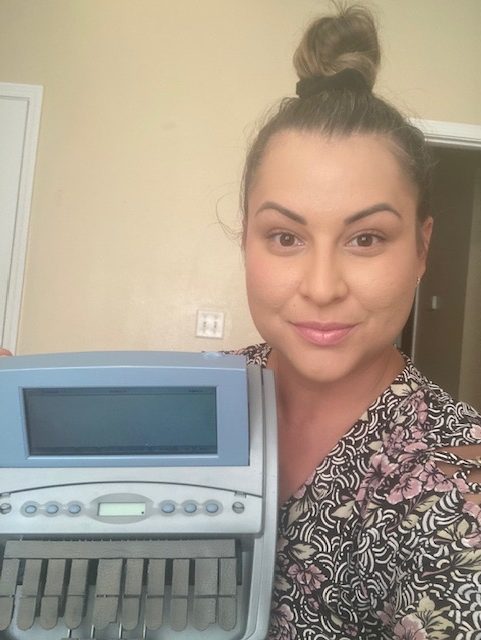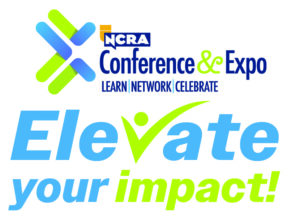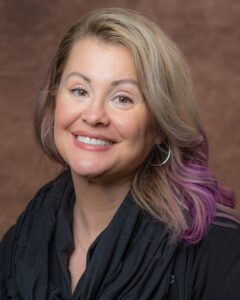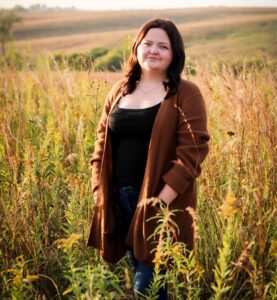Ashley Niewiadomski, a resident of Florida and a student at College of Court Reporting (CCR) in Valparaiso, Ind., will be attending her first NCRA Conference & Expo in person this month. (She attended NCRA Connect Virtual in 2020.) What keeps her motivated in her studies? “I look forward to the day that I am no longer just driving past the courthouse to get to my current job,” she says. “I see myself walking the downtown streets into the courthouse to report for duty.”
UTS | Can you talk a little about your background?
AN | Professionally, I have a background in customer service. Naturally, it has always been my niche, and it’s a career I thrive in. I enrolled in CCR because I had more time set aside in my daily schedule and wanted to work on improving myself and advancing into a challenging career field. The choice to enroll into CCR happened around the time I met Darlene Grandinetti, RPR, a reporter with Phipps Reporting, who taught me about court reporting. I continue to push myself every day to become a stronger, faster writer and no matter how frustrated I’ve been, I still prove to myself that I can overcome the hurdles to becoming a reporter and can’t wait until I graduate.
UTS | How did you first get the idea of being a court reporter? Did you have another career before you started at CCR?
AN | I got the idea of becoming a court reporter from a lady I met at my mother’s birthday party. This is where I will introduce Darlene. She was the first person to tell me job-specific details. After spending most of my time at Mother’s birthday picking Darlene’s brain, I went to my hotel that night and started to research the profession. I spent hours researching schools and sending out emails to connect with administrative staff with different institutions all over the country. While doing my research, I stumbled across [an] introductory course to machine shorthand. I signed up to participate in the next available session which was sometime toward the end of the 2019. I started the introductory course with about 80 other participants, which dwindled down to four people in attendance by the end of the last session. I knew this was going to be a challenge after initially speaking with Darlene and seeing how many people lost interest during the introductory course. Understanding the large dropout rate and seeing it happen all before I even enrolled into a court reporting program did have me second-guess myself and my capabilities. But I’m always up for a challenge so I took the next step, did a little more research on each of the programs available, and found CCR. I knew right away that online courses were going to be the best option. I looked into a handful of options for online schooling and CCR was the best fit for me. I live in Florida at the moment but consider myself a Hoosier because I was raised in the Midwest. It was an easy decision to attend an online school based out of Indiana since I grew up there, having moved when I was 6 years old as a job reassignment for my father. I hope to be able to pursue my court reporting career in the state of Indiana at some point in the future.
UTS | What kinds of challenges have you faced during your court reporting program, particularly during COVID?
AN | I have faced many challenges during my court reporting program. I was working from home during COVID so it was challenging to know that I would spend hours of my day sitting in the same spot working, followed by studying. I was thankful to be a part of CCR during COVID because I was attending my online courses as planned, while most other institutions were figuring out how to make the switch to online teaching since the mandate was to avoid crowded settings and maintain social distancing.
UTS | What is the best advice you’ve been given so far?
AN | The best advice I’ve been given is to understand how your court reporting journey will be different from everbody else’s experience. You have to work hard for self-improvement and take your focus away from other reporters and their journey. Don’t compare yourself and how you are measuring up to other students who have a different study routine than you. You should be able to become self-motivated by looking up to others without putting yourself down and feeling hopeless that you will never be as good. I’ve learned to focus on my own talents and fine-tune my skills where I need improvement. Another piece of advice I always give is to not hold the future against you. I think it’s easy to become so anxious that you forget that this is going to take time, hard work, and all of your commitment. If you look too far ahead, you might lose momentum in your progress because you are comparing yourself to a well-established writer and starting to put negative thoughts in your head about whether or not you will ever be good enough. You need to take every day as an opportunity to practice a new skill, clean up your writing, or create awesome briefs, and if you let the success of others fog your mind then you take away your focus which should be on your own self-improvement. I could go on and on about all the great advice I’ve been given. Lastly, I advise to never give up and keep pushing for your goals.
UTS | What are your plans for when you finish school? What is your dream job?
AN | When I finish school, I would like to start at a court reporting firm until I gain enough knowledge and experience before reevaluating my career path. My main focus will be to work in a role where I will have the opportunity to spend most of my time writing on my writer in order to improve my speed and technique. Also, I would like to get into freelance eventually to take advantage of the flexible schedule freelance reporters have.
UTS | What do you do when you aren’t studying?
AN | When I am not studying, I’m usually hanging out with close friends soaking up the sun on the beautiful Florida coast. I enjoy fishing and boating. I have a very strong passion for dachshunds. I have a fur baby name Pequena, and I enjoy spending my time cuddled up to my best friend, playing with her favorite toy, and feeding her plenty of treats. I have a full-time job which takes up most of my day, so I enjoy being able to cook a dinner for the family and cram in study time with my writer.
UTS | Is there anything else you would like to share about yourself?
AN | I remember running on the treadmills at the gym and always reading the captioning on the televisions. While I was running, I would imagine how fast the captioners were writing and wonder how they could write that fast. When I finally realized the captioners fell into the category of court reporting, I felt a natural calling. I felt this was something I could do and be successful at. It’s pretty neat that I can pursue a career in captioning once I finish school and have the back story about running in the gym and being amazed at reading the captions when I explain how I realized I had an interest in court reporting before I was aware of the career field.
Missed previous issues of Up-to-Speed? Access them here.










